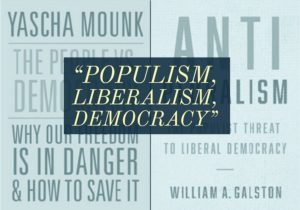 French President Emmanuel Macron’s speech to the U.S. Congress was a full-throated defense of liberal democracy, which for some sparked memories of George W. Bush’s second inaugural address. But there is a key difference, says Brookings Institution’s William Galston. Macron defended not universal values but rather the European project, grounded in Europe’s “identity,” which includes belief in “the democracy Tocqueville spoke about,” liberal democracy, which “respects the individual, minorities, [and] fundamental rights,” he writes for the Wall Street Journal:
French President Emmanuel Macron’s speech to the U.S. Congress was a full-throated defense of liberal democracy, which for some sparked memories of George W. Bush’s second inaugural address. But there is a key difference, says Brookings Institution’s William Galston. Macron defended not universal values but rather the European project, grounded in Europe’s “identity,” which includes belief in “the democracy Tocqueville spoke about,” liberal democracy, which “respects the individual, minorities, [and] fundamental rights,” he writes for the Wall Street Journal:
Europe’s identity extends even further: “It is a culture found nowhere else in the world, which combines this passion for freedom, the taste for equality, and an attachment to diverse ideas, languages and landscapes.” The implication of President Macron’s argument is that while European liberal democracy is an international project, it is not a universal project, because other cultures do not embrace the principles of the project—certainly not in full and not with the same intensity.
 “So oddly, while the French president disagrees with the populist nationalists’ interpretation of European culture, he agrees with them that the foundation of the European project is to be found in culture rather than in universal reason, as the philosophers of the French Revolution believed,” adds Galston (right), a former board member of the National Endowment for Democracy.
“So oddly, while the French president disagrees with the populist nationalists’ interpretation of European culture, he agrees with them that the foundation of the European project is to be found in culture rather than in universal reason, as the philosophers of the French Revolution believed,” adds Galston (right), a former board member of the National Endowment for Democracy.
 Macron – who has previously called for democratic renewal – used the address to Congress to issue a plea to the U.S. to maintain its role as a global defender of democracy and human rights, warning American lawmakers of a “critical moment” in which international institutions could crumble, the Journal adds.
Macron – who has previously called for democratic renewal – used the address to Congress to issue a plea to the U.S. to maintain its role as a global defender of democracy and human rights, warning American lawmakers of a “critical moment” in which international institutions could crumble, the Journal adds.
“If we do not act with urgency as a global community, I am convinced that the international institutions, including the United Nations and NATO, will no longer be able to exist,” Mr. Macron said, referring to the North Atlantic Treaty Organization. He added that authoritarian countries “will then fill the void we leave.”
“What we cherish is at stake,” Macron concluded. “What we love is in danger,” confirming his interest in protecting or extending the alliances and institutions created by the liberal powers, the New Yorker’s Adam Gopnik adds.







